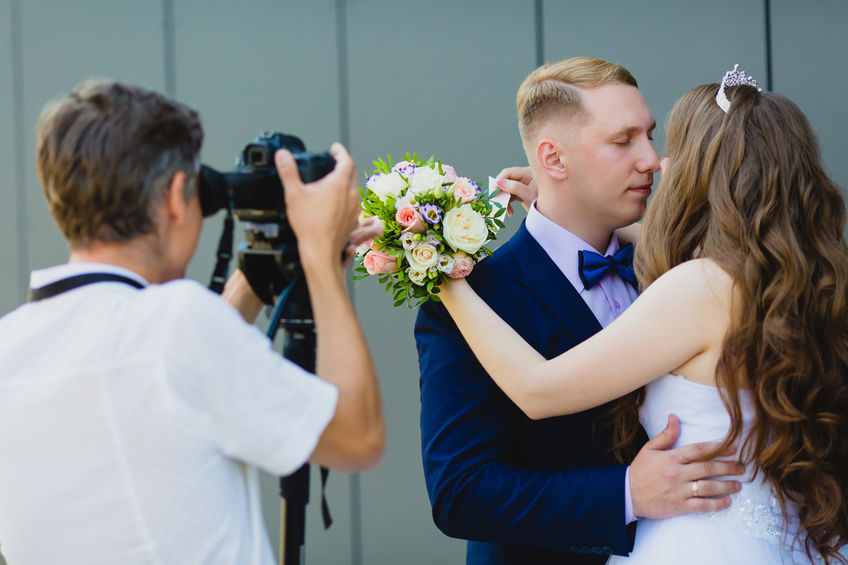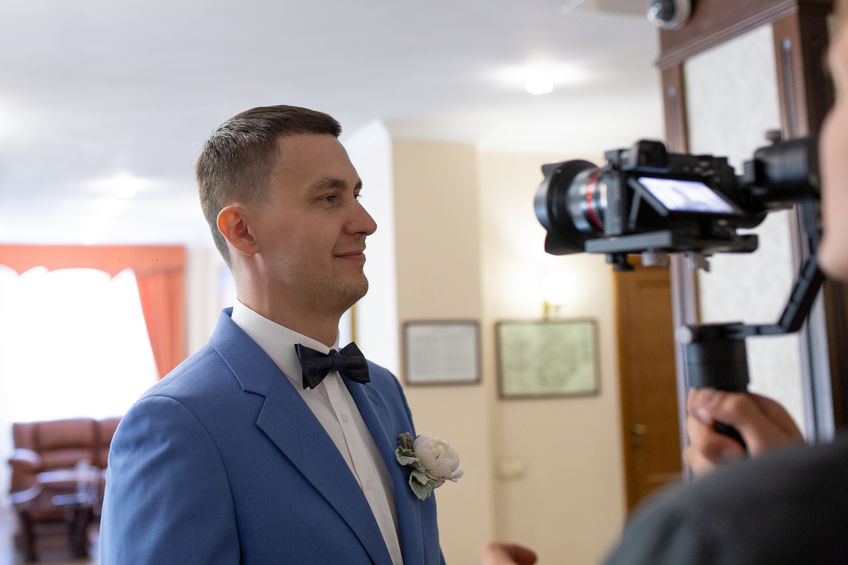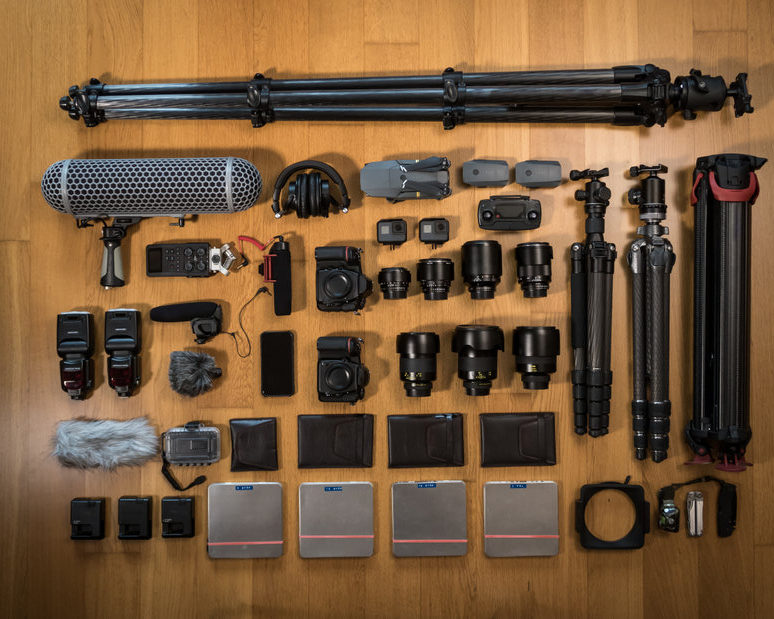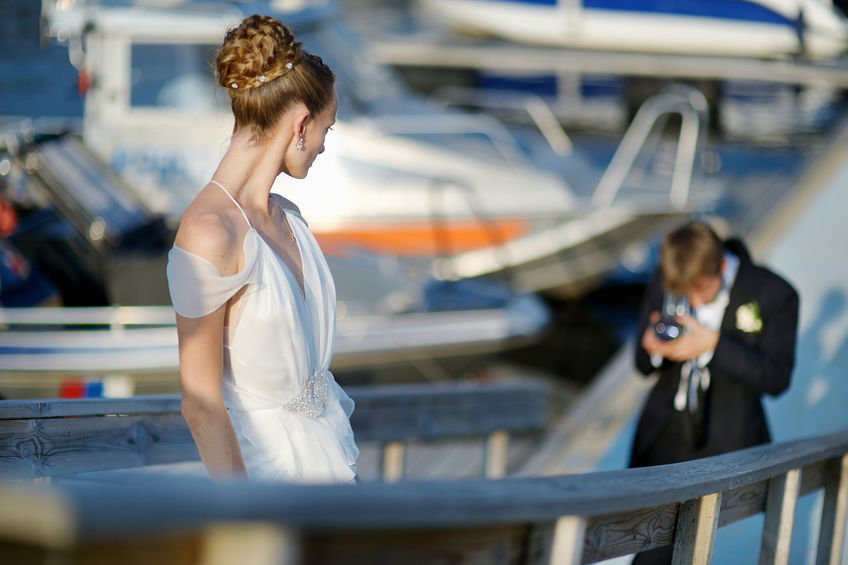Wedding videography is a very lucrative way to begin your videography career. Most of your work will be on the weekends, but that can offer benefits.
This article will explore how to begin your career as a wedding videographer, best practices, tips on what to capture, equipment needed, and what you can reasonably expect to make a year.
Key Takeaways
- Decide if you’ll launch your own business or join a team. Going solo offers freedom, while teaming up can provide steady ground.
- Invest in quality equipment and continuously learn new technologies and techniques to stay competitive.
- Build a diverse portfolio by shooting different styles of weddings, even if it means working for free initially.
- Ensure to capture plenty of footage from the day, including all the special moments.
- Follow the dress code.
- Offering various pricing packages can be a good idea.
Table of Contents
How to become a wedding videographer
There are two primary methods of becoming a wedding videographer. You can start your own business or work for another wedding videography business. Let’s look at some of the pros and cons of both.
Working for another video production company
“Videography company” can be a bit abstract and be the primary business model or a side hustle:
- Some videography companies do weddings as their main business or side hustle.
- Some companies specialize in wedding videography and photography.
- Many video agencies offer it as one of many types of video services.
If you decide to work for a video production company to start in the wedding videography business, you will likely be a freelancer for the company.
Freelancing

A freelancer, or independent contractor, is not a full-time employee and is only hired when help is needed. That’s the basis of most jobs in the film and video industry, so don’t let that scare you.
A video agency will call in a freelancer they’ve worked with or post a job listing on Craigslist, Upwork, Fiverr, etc. You will get hired for either an hourly rate or a fixed rate agreed upon by both parties. You will do the job, get paid, and then move on to look for another job. This can be a bit exhausting!
Some wedding videography companies have consistent job listings you can bid on. This is the easiest method for finding work; working with an established company will take much of the burden off your shoulders.
Unfortunately, weddings are not typically planned in a couple of weeks. You must be prepared to book jobs months or even years in advance. However, there is job security in that you can plan your future months.
Starting your own production company

This route is challenging. Before starting your wedding videography company, I recommend working for someone else to build your portfolio and resume.
However, it’s also the classic chicken-and-egg story: You need to shoot weddings to get hired and get hired to shoot weddings.
Shoot a few weddings for friends for free to build your portfolio
One primary method for accomplishing this is to shoot a few weddings for free. I’ve done this with friends or family who can’t afford to hire a videographer. It puts less pressure on you because you weren’t paid for the job, and it is also great practice.
This will give you footage for your reel, which most wedding videography companies require.
Create a business plan before starting your videography business
Let’s assume you are comfortable shooting weddings and ready to start your own business. You can still accomplish this as a freelancer. You will need to come up with a business plan, which should include items like:
- Equipment
- Video packages
- Business expenses
- Estimated monthly/yearly revenue
- Etc.
This article doesn’t explain how to start a videography business, but these are some basic things to remember. For more insight tips on starting a videography business, check out 40 Video Company Owners Answer: “What I Wish I’d Known Before Starting My Video Production Business.”
Wedding Video Best Practices

Luckily, 99 out of 100 wedding videos you do will likely be the same. Generally, a wedding has three main parts: pre-ceremony, ceremony, and reception.
Today, many clientele prefer a highlight video covering important moments of the night.
What to cover
So it is best practice to record every part of the day. Ensure to capture special and candid moments (fx guest reactions and interactions).
Here’s a small list of items you can expect to shoot:
- Pre-ceremony bride and bridal party (wife team) getting ready
- Pre-ceremony groom and groom party (husband team) getting ready
- B-roll of ceremony venue – building interiors/exteriors, decorations, guests, etc.
- The ceremony
- Post-ceremony family photo-taking
- Reception b-roll – similar to the ceremony
- Reception bride and groom entrance
- Speeches
- Cake cutting
- Dancing
- Etc.
These are all the big moments that happen at a wedding. Making a checklist of what to shoot is key.
It’s always better to get too much footage than too little. You don’t want to start editing and find out you missed a crucial moment or don’t have enough B-roll to make the end product interesting.
With practice, you’ll hone in on what you need later for the editing process. Hours of coverage are great, but they also take up a lot of space on your hard drive. So, setting up a camera to film the buffet table for 4 hours might not be the best use of your gear.
These moments must be edited together interestingly, so don’t be afraid to get crafty with your shots. Stick to the basics until you’re comfortable, but that comes with practice.
Wedding Videography Equipment

One big rule of thumb is that the equipment won’t shoot the video for you. I don’t recommend spending much money initially until you become profitable.
Here’s a list of some of the items you will need:
- Camera & lenses. Here are some great camera choices that will give you a professional look.
- SD cards. Here’s a guide on what size SD-cards you need for 4K video.
- Camera mic (if not included)
- Tripod. Here’s a guide to affordable video tripods.
- Lav mic. Here’s a guide to lav mics.
- Various batteries
- Gimbal. Check out this guide to gimbals and stabilizers.
- Small lights. Here is a guide to some inexpensive lights and tips for what to look for in a light-stand for wedding videography.
- Camera bags
Remember that you will always be on the run. Keeping a lean equipment list is good practice. One or two zoom lenses should suffice.
Have a couple of extra batteries nearby for a quick change. You can also get crafty by finding multiple ways to shoot with your tripod, such as turning it into a monopod, handheld rig, etc.
Attire: What to Wear as a Wedding Videographer

First impressions are important. It’s good practice to check with the bride about any dress code.
A suit, tie, or dress may not be practical, but you should respect your client’s wishes.
A T-shirt and jeans may not leave the impression you want on your new business venture. Remember that future clientele could be at the wedding.
Many wedding videographers wear dress pants or slacks with a nice polo. You want to look like the other guests and not stand out.
Tips for a successful wedding video day
- You’ll likely do all of the planning with the bride. Be sure to get all of the details in writing before the wedding. This will save you a lot of headaches down the road.
- Create a checklist of everything you need to shoot for the day in the order it needs to be shot. Create a schedule based on that checklist.
- Charge batteries and test equipment the night before. You could do this a day or two early, but you should do a check the night before.
- Arrive early. You never know what camera-worthy moments are waiting to happen. This will also give you a contingency for extraordinary events you may encounter on the road. However, don’t arrive so early that you waste your time. 30 minutes is plenty of time to set up and be ready to shoot.
- Take breaks when needed. Production is tough on the body, so it’s important to take a few moments when needed. Be sure to plan these around major events.
- A lav mic is your best friend if you need to record the ceremony’s audio. Lav up the groom 10-15 minutes before the ceremony begins. This should pick up audio for the bride, groom, and officiator. Here’s a guide on how to hide your lav mics.
- There will be downtime between events. Use this time wisely to get b-roll shots to make your video stand out.
- Relax and have fun. You should enjoy yourself as well.
How much you should charge for wedding videography

The million-dollar question. The answer to this can be tough because it depends on your skill level, equipment, etc.
A novice wedding videographer won’t charge the same rates as a veteran with their own company. Your rates will differ depending on whether you are running your own company or being hired as a freelancer.
Creating packages is a good starting point. Most wedding videography companies offer three to five different packages. These packages differ in the number of videographers, the number of events to shoot at the wedding, and the length of the final video edit.
Wedding videography packages and pricing ideas
Below are some sample packages from weddings I have shot in the past with my video company:
Standard – $1000
- Single Videographer
- Up to 2 Hours of Ceremony Coverage
- Up to 2 Hours of Reception Coverage
- 3-5 min. HD Highlight Video
- 30 Day Turnaround
*Travel Fee May Apply
Deluxe – $1500
- Two Videographers
- Up to 2 Hours of Ceremony Coverage
- Up to 3 Hours of Reception Coverage
- 6-8 min. HD Highlight Video
- 30 Day Turnaround
*Travel Fee May Apply
Platinum – $1800
- Two Videographers
- Up to 1 Hour of Pre-Ceremony Coverage
- Up to 2 Hours of Ceremony Coverage
- Up to 3 Hours of Reception Coverage
- 6-8 min. HD Highlight Video
- 30 Day Turnaround
*Travel Fees May Apply
Items Available For Additional Fee
- Raw Footage
- Additional Highlight Video Minutes
- Additional Hours
- Faster Turnaround
- Shots from the Rehearsal Dinner
- Drone Footage
As you can see, most of the packages were based on how long I was required to shoot, the number of videographers, the length of the edit, etc. I also added fees for other materials that could interest the wedding party.
These sample packages are just a guide to help you decide what you can charge. You can increase or decrease your prices if you feel it is warranted. I shot weddings much cheaper earlier in my career.
Wedding videographer salary
What you charge a company as a freelancer will depend highly on the job. I have been hired for several weddings at $40 to $75 an hour.
You will need to decide what makes sense for you. Consider the cost of running your business, your general living expenses, and your goals for the future.
If you consistently shoot weddings, you can expect to earn a decent wage annually. Depending on the location, most videographers can make $40,000 to $75,000 a year. One of the benefits of freelancing is you can make as much or as little as you desire.
Conclusion
I hope you found this article helpful. Wedding videography can seem like a daunting business to break into. However, with enough practice, it can become very lucrative. People are always getting married, so it’s a reliable business to count on.
Use this article as a guide to get you started, but going out into the field is the best way to figure it out. Be patient, learn from your successes and mistakes, and be on your way to a profitable business.

